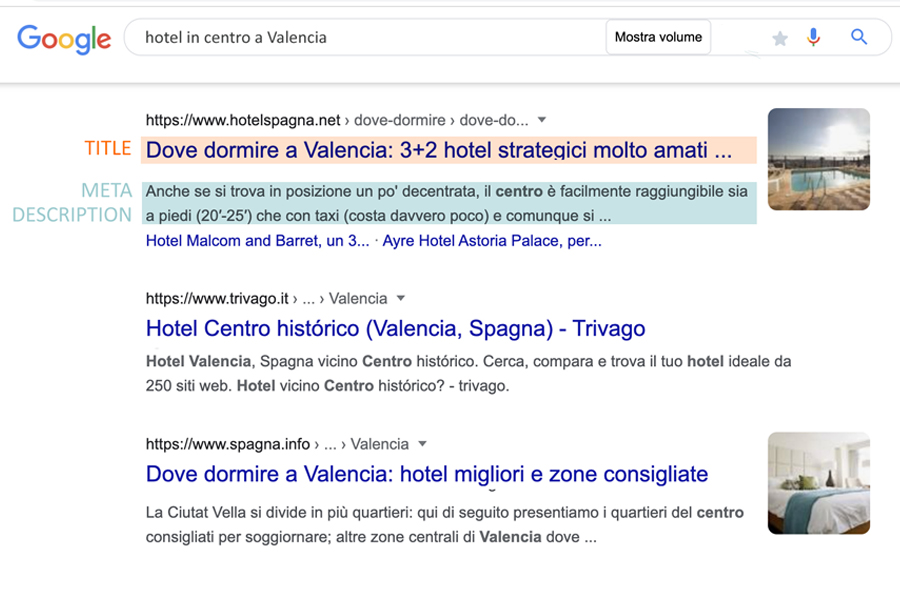Dear WuBookers,
you know how important it is to have a website, which represents a real business card even for an accommodation facility. Customers come through the website, of course, but before we win their heart, we need to break into that of Google. How? Optimizing contents and improving the positioning thanks to some SEO for hotels tips. Let’s see what it’s about.
How search engines work
Search engines like Google work thanks to complex algorithms. They analyze data and sort them on the basis of the keyword used for the search, according to relevance and pertinence. The outcome of this process is what we call SERP (acronym for Search Engine Results Page): this is the page where are shown the results that the search engine gives as a response to the user’s request.
SERPs contain two types of results. The paid ones are based on the Google Ads service and usually appear first with the words “advisor”. The organic ones, on the other hand, are found further down the page and are the result of website optimization strategies and attention to other aspects that we will see in this article.

What is SEO and why is it so important
A little by intuition, a little by experience, we know that when we type “hotel in [city name]” in the search string we get relevant links (or at least a good part of the links that respond to our search). But why does Google show us those sites? And why is yours not showing up? How can you be found by potential customers?
You need to know SEO (Search Engine Optimization), which is also of strategic importance for the hospitality sector. This branch of digital marketing specialized in a series of activities that improve crawling, indexing and positioning on search engines. This increases the chances of Google seeing the site and showing it as a search result. Additionally, optimizing your website will offer potential guests a great browsing experience and incentivize them to book a room.
On page and Off page SEO
SEO activities are multiples and not all of them concern the web site. On page SEO includes strategies such as the study of keywords and their use in content, the organization of the web site architecture, code and image optimization.
Off page SEO, on the other hand, deals with link building and digital PR, and therefore concerns relationships and interactions with other sites and other realities present online.
SEO for hotels: tips to optimize your website
SEO gives you the ability to get as many bookings as possible from user searches, and can give you a big advantage over competitors. The hospitality market, actually, can be saturated in some areas, such as large tourist destinations. If your web site is well optimized, the chances of it appearing in searches will be higher.
SEO is also less expensive than traditional advertising, Google Ads campaigns and social media campaigns.
So let’s see some useful tips!
Define your target
The first step in building an SEO strategy for your hotel website is to define your target audience. You will have to answer questions like:
- Who are the people staying in the facility?
- What are their habits?
- How old are they?
- Where do they come from and how do they move?
- How do they book?
- In what period of the year do they travel and for how long?
This information will help you build a detailed profile of your customers.
Do a keyword research
The keyword search is used to identify and predict with which terms people search for an activity on Google. Let’s take a practical example: Jane wants to go on holiday to Valencia and searches for “best hotels in Valencia”, “hotels in the center of Valencia” and other similar search terms, depending on what her preferences for the stay are.
Once you have identified these words, you can use them to write the site texts and other elements, the metadata: page titles and meta descriptions. These elements, which are shown by the search engine in SERP, must be unique and are used to tell what that page is about to people who look at the results.
To get an overview of the terms relevant to your business, you can do research on facilities in your region or city and study the SERPs. The search for keywords, on the other hand, is carried out using specific tools and platforms, some also available in a free version.

Analyze your competitors
Sometimes inspiration or a good strategy can come from observing what your competitors are doing. It is not about copying their moves and hoping that they also work for your site (often this does not happen, because there is a specific logic behind it), but about finding your way.
For example: there are many historical monuments in the area where your property is located, but none of your competitors have an in-depth section on their site with this information? You could then consider exploiting the topic for your blog. Do some research, check for keywords, and build an editorial plan for publications.
Write useful and relevant content
Each text on your site must have its own logic within the strategy, but it must also be clear, provide useful and relevant information. Google algorithms classify website pages and if you write quality content you can be rewarded by the search engine.
Other tips to improve optimization
We have seen some basic steps to start working on your website SEO and get more visibility on search engines. Here are a few more tips for you.
- Use high-resolution photos and do not modify the images too much: it is important to give the potential customer a realistic idea of what they will find in the property and its surroundings.
- Optimize the web site for mobile devices: remember that most bookings are made via smartphone.
- Add videos: humans process faster visual than textual information and video content is therefore more engaging for those who enjoy it.
- Update the web site, both in terms of content and technologies.
This is a taste of what can be done for SEO optimization of a hotel website. It is a complex and articulated work, which must be carried out with competence and without haste: it takes some time to see the first results. If done in the right way, however, it can really make the difference between you and your competitors, with a significant return in terms of booking and visibility of your property.
